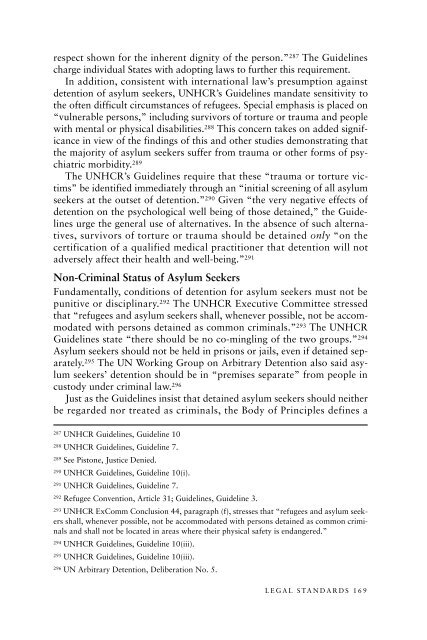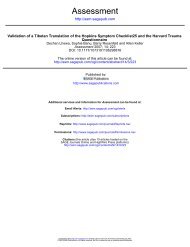From Persecution to Prison - Bellevue/NYU Program for Survivors of ...
From Persecution to Prison - Bellevue/NYU Program for Survivors of ...
From Persecution to Prison - Bellevue/NYU Program for Survivors of ...
You also want an ePaper? Increase the reach of your titles
YUMPU automatically turns print PDFs into web optimized ePapers that Google loves.
espect shown <strong>for</strong> the inherent dignity <strong>of</strong> the person.” 287 The Guidelinescharge individual States with adopting laws <strong>to</strong> further this requirement.In addition, consistent with international law’s presumption againstdetention <strong>of</strong> asylum seekers, UNHCR’s Guidelines mandate sensitivity <strong>to</strong>the <strong>of</strong>ten difficult circumstances <strong>of</strong> refugees. Special emphasis is placed on“vulnerable persons,” including survivors <strong>of</strong> <strong>to</strong>rture or trauma and peoplewith mental or physical disabilities. 288 This concern takes on added significancein view <strong>of</strong> the findings <strong>of</strong> this and other studies demonstrating thatthe majority <strong>of</strong> asylum seekers suffer from trauma or other <strong>for</strong>ms <strong>of</strong> psychiatricmorbidity. 289The UNHCR’s Guidelines require that these “trauma or <strong>to</strong>rture victims”be identified immediately through an “initial screening <strong>of</strong> all asylumseekers at the outset <strong>of</strong> detention.” 290 Given “the very negative effects <strong>of</strong>detention on the psychological well being <strong>of</strong> those detained,” the Guidelinesurge the general use <strong>of</strong> alternatives. In the absence <strong>of</strong> such alternatives,survivors <strong>of</strong> <strong>to</strong>rture or trauma should be detained only “on thecertification <strong>of</strong> a qualified medical practitioner that detention will notadversely affect their health and well-being.” 291Non-Criminal Status <strong>of</strong> Asylum SeekersFundamentally, conditions <strong>of</strong> detention <strong>for</strong> asylum seekers must not bepunitive or disciplinary. 292 The UNHCR Executive Committee stressedthat “refugees and asylum seekers shall, whenever possible, not be accommodatedwith persons detained as common criminals.” 293 The UNHCRGuidelines state “there should be no co-mingling <strong>of</strong> the two groups.” 294Asylum seekers should not be held in prisons or jails, even if detained separately.295 The UN Working Group on Arbitrary Detention also said asylumseekers’ detention should be in “premises separate” from people incus<strong>to</strong>dy under criminal law. 296Just as the Guidelines insist that detained asylum seekers should neitherbe regarded nor treated as criminals, the Body <strong>of</strong> Principles defines a287UNHCR Guidelines, Guideline 10288UNHCR Guidelines, Guideline 7.289See Pis<strong>to</strong>ne, Justice Denied.290UNHCR Guidelines, Guideline 10(i).291UNHCR Guidelines, Guideline 7.292Refugee Convention, Article 31; Guidelines, Guideline 3.293UNHCR ExComm Conclusion 44, paragraph (f), stresses that “refugees and asylum seekersshall, whenever possible, not be accommodated with persons detained as common criminalsand shall not be located in areas where their physical safety is endangered.”294UNHCR Guidelines, Guideline 10(iii).295UNHCR Guidelines, Guideline 10(iii).296UN Arbitrary Detention, Deliberation No. 5.LEGAL STANDARDS 169



